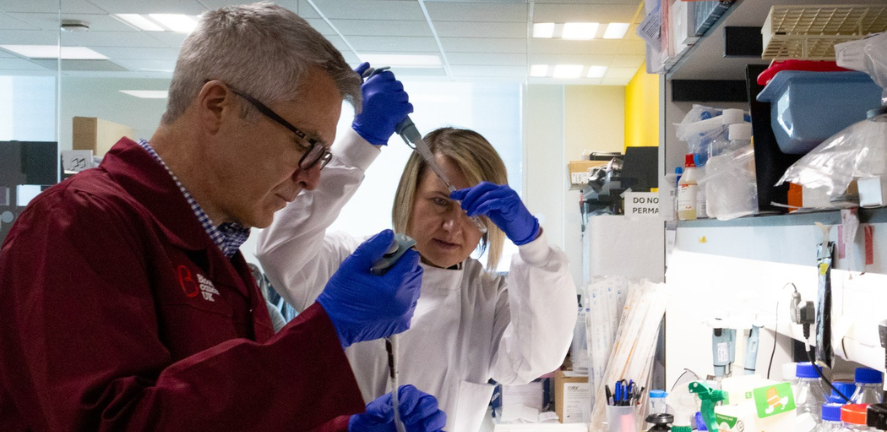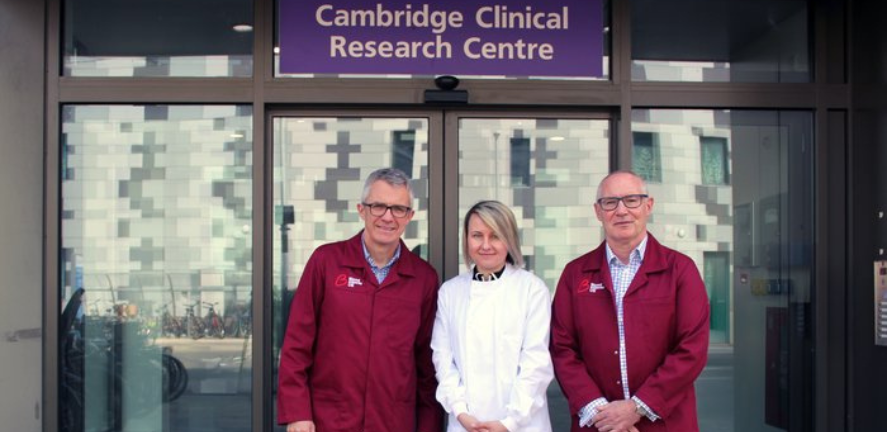
Submitted by Laura Puhl on Thu, 17/04/2025 - 10:18
Research out this week from the Vassiliou and Huntly Groups shows that a common diabetes drug could prevent a form of acute myeloid leukaemia in people at high risk of the disease.
The research, published 16 April in Nature, found that metformin, a widely used and readily available diabetes drug, could prevent abnormal blood stem cells with genetic changes from progressing to Acute Myeloid Leukaemia (AML), an aggressive form of blood cancer that is very difficult to treat.
Around 3,100 people are diagnosed with AML each year in the UK. Thanks to recent advances, individuals at high risk of AML can be identified years in advance using blood tests and blood DNA analysis, but there’s no suitable treatment that can prevent them from developing the disease.
In this study, Professor George Vassiliou and his colleagues at the Cambridge Stem Cell Institute and the University of Cambridge focused on the most common genetic change in abnormal blood cells, which affects a gene called DNMT3A and is responsible for starting 10-15% of AML cases. The research team examined blood stem cells from mice with the same changes in DNMT3A as seen in the pre-cancerous cells in humans. Using a genome-wide screening technique, they showed that these cells depend more on mitochondrial metabolism than healthy cells, making this a potential weak spot.
The researchers went on to confirm that metformin, and other mitochondria-targeting drugs, substantially slowed the growth of mutation-bearing blood cells in mice. Further experiments also showed that metformin could have the same effect on human blood cells with the DNMT3A mutation. Additionally, the study looked at data from over 412,000 UK Biobank volunteers and found that people taking metformin were less likely to have changes in the DNMT3A gene. This link remained even after accounting for factors that could have confounded the results such as diabetes status and BMI.
The next phase of this research will involve clinical trials to test metformin’s effectiveness in people with changes in DNMT3A at increased risk of developing AML. With metformin already approved and widely used for diabetes, this repurposing strategy could dramatically reduce the time it takes to bring a new preventive therapy to patients.
Professor Vassiliou, an Honorary Consultant Haematologist at Cambridge University Hospitals NHS Foundation Trust (CUH) co-led the study. He highlighted the significance of the work: “Blood cancer poses unique challenges compared to solid cancers like breast or prostate, which can be surgically removed if identified early. With blood cancers, we need to identify people at risk and then use medical treatments to stop cancer progression throughout the body.”
Dr Malgorzata Gozdecka, Senior Research Associate at the Cambridge Stem Cell Institute and first author of the research said: “Metformin is a drug that impacts mitochondrial metabolism, and these pre-cancerous cells need this energy to keep growing. By blocking this process, we stop the cells from expanding and progressing towards AML, whilst also reversing other effects of the mutated DNMT3A gene.”
Professor Brian Huntly, Head of the Department of Haematology at the University of Cambridge, Honorary Consultant Haematologist at CUH, and joint lead author of the research, added: “Metformin appears highly specific to this mutation rather than being a generic treatment. That specificity makes it especially compelling as a targeted prevention strategy. We’ve done the extensive research all the way from cell-based studies to human data, so we’re now at the point where we have a made a strong case for moving ahead with clinical trials. Importantly, metformin’s lack of toxicity will be a major advantage as it is already used by millions of people worldwide with a well-established safety profile.”
This research was funded by Blood Cancer UK with additional funds from Cancer Research UK, the Leukemia and Lymphoma Society (USA), and the Wellcome Trust.


